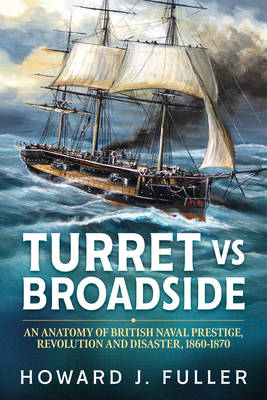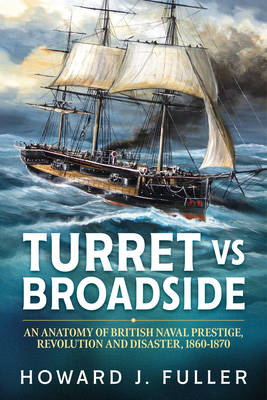
Bedankt voor het vertrouwen het afgelopen jaar! Om jou te bedanken bieden we GRATIS verzending (in België) aan op alles gedurende de hele maand januari.
- Afhalen na 1 uur in een winkel met voorraad
- In januari gratis thuislevering in België
- Ruim aanbod met 7 miljoen producten
Bedankt voor het vertrouwen het afgelopen jaar! Om jou te bedanken bieden we GRATIS verzending (in België) aan op alles gedurende de hele maand januari.
- Afhalen na 1 uur in een winkel met voorraad
- In januari gratis thuislevering in België
- Ruim aanbod met 7 miljoen producten
Zoeken
Turret Versus Broadside
An Anatomy of British Naval Prestige, Revolution and Disaster 1860-1870
Howard J Fuller
€ 48,95
+ 97 punten
Omschrijving
On the 150th anniversary of the capsizing of Britain's low-freeboard yet fully-masted ironclad HMS Captain, this widely researched, intensive analysis of the great 'turret vs. broadside' debate sheds new light on how the most well-funded and professional navy in the world at the height of its power could nevertheless build an 'inherently unstable' capital ship.
Utilizing an impressive array of government reports, contemporary periodicals, and unpublished personal papers, this definitive study crucially provides for the first time both a long-term and international context. The 1860s was a pivotal decade in the evolution of British national identity as well as warship design, nor were these two elements mutually exclusive. 1860 began gloriously with the launch of Britain's first ocean-going ironclad, HMS Warrior, but 1870 ended badly with the Captain. Along the way, British public and political faith in the supremacy of the Royal Navy was not reaffirmed as some histories suggest, but wavered. The growing emphasis upon new technologies including ever heavier guns and thicker armor plating for men-of-war was not 'decisive' but divisive, as pressure mounted to somehow combine the range of Warrior with the unique protection and hitting power of American monitor-ironclads of the Civil War. As the geopolitical debate over rival ironclad proposals intensified, aggressively-minded Prime Minister Lord Palmerston gradually adopted a non-interventionist foreign policy which surprised his contemporaries. Turret vs. Broadside traces the previously unexplored connection between an increasingly schizophrenic Admiralty for and against the Captain, for example, and saber-rattling mid-Victorians sinking into an era of 'Splendid Isolation'.
"Dr. Fuller teaches us a crucial lesson: that circumstances could be far more effective in underpinning British naval supremacy, even at its height, than Admiralty planning." C. I. Hamilton, author of The Making of the Modern Admiralty: British Naval Policy-Making, 1805-1927
Utilizing an impressive array of government reports, contemporary periodicals, and unpublished personal papers, this definitive study crucially provides for the first time both a long-term and international context. The 1860s was a pivotal decade in the evolution of British national identity as well as warship design, nor were these two elements mutually exclusive. 1860 began gloriously with the launch of Britain's first ocean-going ironclad, HMS Warrior, but 1870 ended badly with the Captain. Along the way, British public and political faith in the supremacy of the Royal Navy was not reaffirmed as some histories suggest, but wavered. The growing emphasis upon new technologies including ever heavier guns and thicker armor plating for men-of-war was not 'decisive' but divisive, as pressure mounted to somehow combine the range of Warrior with the unique protection and hitting power of American monitor-ironclads of the Civil War. As the geopolitical debate over rival ironclad proposals intensified, aggressively-minded Prime Minister Lord Palmerston gradually adopted a non-interventionist foreign policy which surprised his contemporaries. Turret vs. Broadside traces the previously unexplored connection between an increasingly schizophrenic Admiralty for and against the Captain, for example, and saber-rattling mid-Victorians sinking into an era of 'Splendid Isolation'.
"Dr. Fuller teaches us a crucial lesson: that circumstances could be far more effective in underpinning British naval supremacy, even at its height, than Admiralty planning." C. I. Hamilton, author of The Making of the Modern Admiralty: British Naval Policy-Making, 1805-1927
Specificaties
Betrokkenen
- Auteur(s):
- Uitgeverij:
Inhoud
- Aantal bladzijden:
- 381
- Taal:
- Engels
- Reeks:
Eigenschappen
- Productcode (EAN):
- 9781913336226
- Verschijningsdatum:
- 13/01/2021
- Uitvoering:
- Paperback
- Formaat:
- Trade paperback (VS)
- Afmetingen:
- 155 mm x 234 mm
- Gewicht:
- 816 g

Alleen bij Standaard Boekhandel
+ 97 punten op je klantenkaart van Standaard Boekhandel
Beoordelingen
We publiceren alleen reviews die voldoen aan de voorwaarden voor reviews. Bekijk onze voorwaarden voor reviews.









